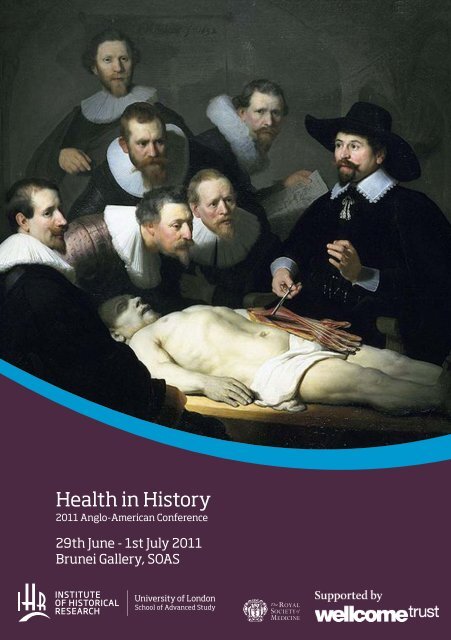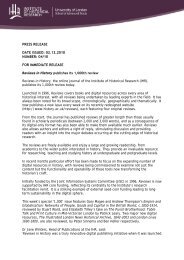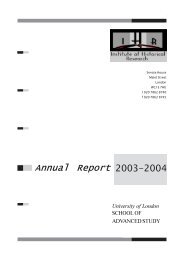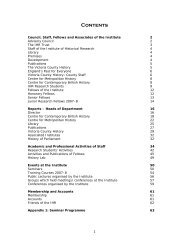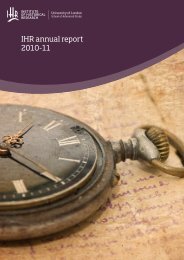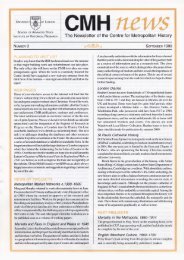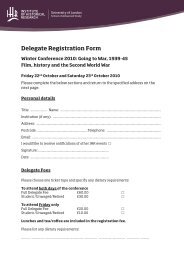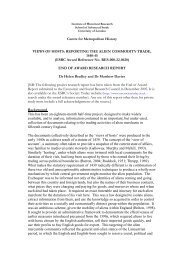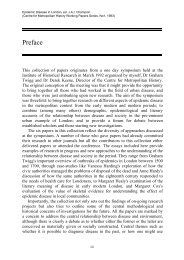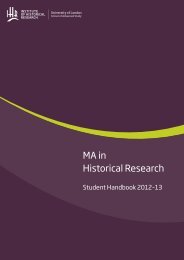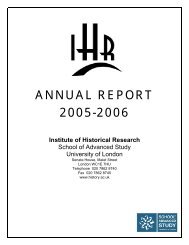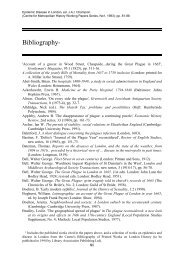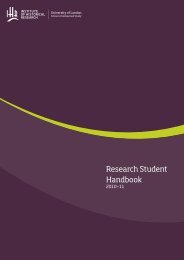here - Institute of Historical Research
here - Institute of Historical Research
here - Institute of Historical Research
Create successful ePaper yourself
Turn your PDF publications into a flip-book with our unique Google optimized e-Paper software.
Health in History<br />
2011 Anglo-American Conference<br />
29th June - 1st July 2011<br />
Brunei Gallery, SOAS
Foreword<br />
Wednesday 29th June<br />
9.30am<br />
Registration will be taking place in the Brunei Gallery foyer<br />
Registration<br />
Since the 1980s the history <strong>of</strong> medicine and <strong>of</strong> human society in<br />
sickness and health has become an ever widening window through<br />
which the present can view the past. Best-selling historians such<br />
as Roy Porter have brought the subject out <strong>of</strong> obscurity. The major<br />
support <strong>of</strong> institutions such as the Wellcome Trust and RCUK has<br />
secured the field <strong>of</strong> study as a serious discipline. Nowadays the<br />
ways in which societies over time and at war and in peace have<br />
defined and treated their ‘sick’, the changing content and status <strong>of</strong><br />
medical expertise and ethics, and those episodic moments when<br />
the globe has been transformed by epidemic, panic and panacea are<br />
all integral parts <strong>of</strong> mainstream history. The field <strong>of</strong> medical history<br />
stretches from palaeopathology through to contemporary political<br />
debates over health care and genomics. And the medical humanities<br />
are now critically placed in most cultures at the meeting point <strong>of</strong><br />
research and social policy. For all these reasons and in all <strong>of</strong> these<br />
ways, the <strong>Institute</strong> <strong>of</strong> <strong>Historical</strong> <strong>Research</strong> is pleased and proud to be<br />
holding its flagship event, the Anglo-American Conference, on the<br />
subject <strong>of</strong> Health in History.<br />
Events<br />
A5 Headline<br />
Sub header 7pt<br />
Miles Taylor, Director <strong>of</strong> the IHR<br />
10.00am<br />
Welcome<br />
Brunei Gallery Lecture<br />
Theatre<br />
10.15am<br />
Plenary lecture<br />
Brunei Gallery Lecture<br />
Theatre<br />
11.15am<br />
Morning tea/c<strong>of</strong>fee break<br />
11.30am<br />
Parallel panels<br />
Medical statistics and<br />
sources<br />
Ecclesiastical History<br />
room, IHR<br />
Events<br />
A5 Headline<br />
Sub header 7pt<br />
Welcome from the Vice-Chancellor, Pr<strong>of</strong>essor Ge<strong>of</strong>frey<br />
Crossick<br />
Chair: Miles Taylor (IHR)<br />
Monica Green (Arizona State University) Going global:<br />
thoughts on the ambitions <strong>of</strong> medical history<br />
Tea and c<strong>of</strong>fee will be served in the Brunei Suite and<br />
outside the Brunei Gallery Lecture Theatre<br />
Start <strong>of</strong> morning panel sessions<br />
Chair: Andrea Tanner (Great Ormond Street Hospital for<br />
Children)<br />
Eilidh Garrett and Alice Reid (Cambridge) Doctors and the<br />
certification <strong>of</strong> death in nineteenth century Scotland: an<br />
urban-rural comparison<br />
Sarah Hutton (The National Archives) ‘A most foul and<br />
putrid mass’: archival sources for nineteenth century<br />
public health<br />
Eric Boyle (Office <strong>of</strong> National <strong>Institute</strong> <strong>of</strong> Health History)<br />
Institutionalising complementary and alternative medicine<br />
at the National <strong>Institute</strong> <strong>of</strong> Health<br />
David Wright (McMaster) Mortality and madness in four<br />
Victorian mental hospitals, c. 1841-1891
3 4<br />
Ancient and modern<br />
knowledge in medical<br />
technologies<br />
B204, Brunei Gallery<br />
Chair: Janet Waymark (IHR)<br />
Lisa Jarman (Exeter) The Galenic tradition and responses to<br />
alternative medicine and new technology in seventeenth<br />
century England<br />
Sally Osborn (Roehampton) Manuscript medical recipes in<br />
eighteenth century England: the case <strong>of</strong> Caroline Powys<br />
Modernising the<br />
medical marketplace<br />
Germany room, IHR<br />
Chair: George Gosling (Oxford Brookes)<br />
Hilary Marland (Warwick) Medicine and the family: selfdosing<br />
at home in Victorian England<br />
Claire Jones (Warwick) Beyond medical orthodoxy:<br />
practitioners and the promotion <strong>of</strong> contraceptive products<br />
in late nineteenth and early twentieth century Britain<br />
Constructing an<br />
alternative base <strong>of</strong><br />
medical knowledge:<br />
Japan’s response to<br />
western medicine in<br />
the nineteenth century<br />
B203, Brunei Gallery<br />
Healing and religion in<br />
African colonial history<br />
Events<br />
A5 Headline<br />
Wolfson room, IHR<br />
Sub header 7pt<br />
Michelle Payne (Sussex) Secret abortifacients? Treatments<br />
for provoking the menses in early modern medical texts<br />
Chair: Ann Jannetta (Pittsburgh)<br />
Discussant: Akihito Suzuki (Keiō University, Tokyo)<br />
Ann Jannetta (Pittsburgh) Innovation and stagnation:<br />
contrasting approaches to global changes in medical<br />
knowledge in early nineteenth century Japan<br />
Maki Fukuoka (Michigan) Public exhibitions <strong>of</strong> medicinal<br />
plants and debates about their efficacy in nineteenth<br />
century Japan<br />
Susan L. Burns (Chicago) Translation, tradition, and the<br />
politics <strong>of</strong> medicine in late nineteenth century Japan: Kure<br />
Shūzō and the creation <strong>of</strong> psychiatric terminology<br />
Chair: Kathleen Vongsathorn (Oxford)<br />
Nina Studer (Zurich/Oxford) Protective device or a sign <strong>of</strong><br />
degeneration? The role <strong>of</strong> Islam in the writings <strong>of</strong> French<br />
colonial psychiatrists<br />
Kathleen Vongsathorn (Oxford) In the image <strong>of</strong> Britain:<br />
Lake Bunyonyi leprosy settlement as a model community,<br />
Uganda, 1931-1951<br />
Georgina Endfield (Nottingham) ‘No place for a woman’:<br />
health, medicine and women’s work among missionary<br />
wives and female missionaries in British colonial Africa<br />
Healthy living in<br />
medieval and early<br />
modern Europe:<br />
medical and lay<br />
perspectives<br />
I: Sleep exercise and<br />
passions<br />
Low Countries room,<br />
IHR<br />
Military medical bodies:<br />
patients, power and<br />
practice in the British<br />
empire<br />
Events<br />
A5 Headline<br />
Brunei Gallery Lecture<br />
Theatre<br />
Sub header 7pt<br />
Roberta Bivins (Warwick) Weights and measures: selling<br />
domestic technologies <strong>of</strong> medical surveillance in the<br />
twentieth century<br />
Chair: Silvia De Renzi (Open University)<br />
Bill MacLehose (University College London) Sleep, health<br />
and pathology in medieval medicine<br />
Tessa Storey (Royal Holloway) Managing the passions and<br />
comforting the spirits: medical advice and lay experience<br />
in Italy, 1470-1700<br />
Sandra Cavallo (Royal Holloway) Gentle exercise and<br />
genteel life: movement and health in medical advice and<br />
lay practice in sixteenth and seventeenth century Italy<br />
Chair: Julie Anderson (Kent)<br />
Ana Carden-Coyne (Manchester) Men in pain: sociality,<br />
brutality and resistance in military hospitals, 1914-1918<br />
Wendy D. Churchill (New Brunswick) The right to care:<br />
military men and British imperial medicine, 1780-1820<br />
Michael Brown (Roehampton) From Social Darwinism to<br />
physical culture: the problem <strong>of</strong> the medico-military body<br />
in the age <strong>of</strong> new imperialism
5<br />
6<br />
1.00pm<br />
Lunch<br />
A sandwich lunch will be made available for all attendees.<br />
The Publishers’ fair will continue in the Brunei Suite and<br />
outside the Brunei Lecture Theatre.<br />
Emma Reilly (Strathclyde) ‘They passed me A1 fit, can you<br />
believe it?’: the British Army body and the military medical<br />
exam, 1939-1945<br />
2.00pm<br />
Parallel panels<br />
Kathleen Meghan Fitzpatrick (King’s College London)<br />
Weathering the storm: Commonwealth combat psychiatry<br />
in Korea, 1950-1951<br />
Hospitals in mid<br />
twentieth century<br />
Britain and France<br />
B203, Brunei Gallery<br />
Chair: Barry Doyle (Huddersfield)<br />
Barry Doyle (Huddersfield) The hospital crisis in post-war<br />
Britain and France: Leeds and Lille, 1918-28<br />
Martin Gorsky (London School <strong>of</strong> Hygiene and Tropical<br />
Medicine) The legacy <strong>of</strong> the Poor Law: long-stay hospitals<br />
and older people in the west <strong>of</strong> England, 1929-1950<br />
Missionary bodies and<br />
medical spaces<br />
Wolfson room, IHR<br />
Chair: Peter Webster (IHR)<br />
Emily Manktelow (Exeter) Missionary bodies, domestic<br />
spaces<br />
Esmé Cleall (Liverpool) ‘More bad news’: narratives <strong>of</strong><br />
sickness in missionary writing, c. 1840-1890<br />
Nick Hayes (Nottingham Trent) Did we really want a<br />
National Health Service? Popular opinion and patients’<br />
views on existing voluntary hospital provision<br />
Rosemary Fitzgerald (School <strong>of</strong> Oriental and African<br />
Studies) Purdah patients at home and in hospital:<br />
transforming female missionary medicine in north India,<br />
1890–1914<br />
Healthy living in<br />
medieval and early<br />
modern Europe:<br />
medical and lay<br />
perspectives<br />
II: Food, diet and<br />
lifestyle<br />
Events<br />
A5 Headline<br />
B204, Brunei Gallery<br />
Fighting fit: exploring<br />
military medicine<br />
Sub header 7pt<br />
Ecclesiastical History<br />
room, IHR<br />
Chair: Sandra Cavallo (Royal Holloway)<br />
Silvia De Renzi (Open University) ‘Eggs and fish made him<br />
sick …’: negotiating fasting in Counter Reformation Rome<br />
Maria Pia Donato (Cagliari) Saving lives: medical discourse<br />
on sudden death and lifestyle in the seventeenth and<br />
eighteenth centuries<br />
Chair: Ana Carden-Coyne (Manchester)<br />
Peter Starling (Army Medical Services Museum) Medical<br />
education and good wine: the formation <strong>of</strong> the army<br />
medical school and medical education in the British army in<br />
the later nineteenth century<br />
Bioethics in Britain,<br />
1960s-1990s<br />
Germany room, IHR<br />
Events<br />
A5 Headline<br />
Sub header 7pt<br />
David Reubi (London School <strong>of</strong> Hygiene and Tropical<br />
Medicine) Re-moralising medicine: the bioethical thought<br />
collective and the regulation <strong>of</strong> the body in British medical<br />
research<br />
Duncan Wilson (Manchester) Philosophy, public policy,<br />
and the contested notion <strong>of</strong> ‘moral experts’ in the Anglo-<br />
American history <strong>of</strong> bioethics, c. 1975–1985<br />
Alex Mold (London School <strong>of</strong> Hygiene and Tropical<br />
Medicine) Autonomy and the English patient: patientconsumer<br />
groups and patient autonomy during the 1960s<br />
and 1970s<br />
Mark Harrison (Oxford) Great expectations: the South<br />
African War and the reform <strong>of</strong> British military medicine
7 8<br />
Medical<br />
autobiographies in<br />
modern Britain and<br />
Ireland<br />
Low Countries room, IHR<br />
Healthy air<br />
Brunei Gallery Lecture<br />
Theatre<br />
Chair: Cornelie Usborne (IHR)<br />
Claire Jones (Warwick) and Niels van Manen (Manchester/<br />
IHR) Henry Trentham Butlin: surgery, politics and markets<br />
in late Victorian Britain<br />
Màire Àine Sheehan (Cork) Three Gaelic medical families in<br />
seventeenth century Ulster: exclusion or assimilation?<br />
Mike Emanuel (Oxford Brookes) To grow the children in the<br />
open air: a history <strong>of</strong> the open air school movement in the<br />
early twentieth century<br />
Julie Anderson (Kent) Healthy spaces? Disability and the<br />
countryside 1900-1930<br />
Charlotte Jones (University College London) ‘A load <strong>of</strong> hot<br />
air’? The therapeutic value <strong>of</strong> the Turkish bath in Victorian<br />
Britain<br />
5.00pm<br />
Policy Forum<br />
Brunei Gallery Lecture<br />
Theatre<br />
6.30pm<br />
Prothero reception<br />
Wilkins Jeremy Bentham<br />
room, UCL, Gower Street<br />
Organised by the Centre for History in Public Health,<br />
London School <strong>of</strong> Hygiene and Tropical Medicine<br />
Historians in the Policy Environment<br />
Chair: Virginia Berridge<br />
Participants:<br />
James Kneale (University College London)<br />
James Nicholls (University <strong>of</strong> Bath)<br />
David Turner (House <strong>of</strong> Commons Health Committee)<br />
Melissa Smith (Office <strong>of</strong> Civil Society)<br />
Jill Rutter (<strong>Institute</strong> <strong>of</strong> Government)<br />
A reception to follow the Prothero lecture, which will take<br />
place in the Cruciform Lecture Theatre 1, UCL at 5.30pm<br />
and will feature speaker Paul Kennedy (Yale) who will be<br />
presenting a paper on History from the Top, from Below –<br />
AND from the Middle<br />
Karen Jones (Kent) ‘Nature as tonic’: public health and the<br />
invention <strong>of</strong> the park<br />
3.30pm<br />
Afternoon tea/c<strong>of</strong>fee break<br />
4.00pm<br />
Plenary lecture<br />
Events<br />
A5 Headline<br />
Brunei Gallery Lecture<br />
Theatre<br />
Sub header 7pt<br />
Chair: Vivian Bickford-Smith (IHR)<br />
David Arnold (Warwick) The medicalisation <strong>of</strong> poverty:<br />
India, 1870-1960<br />
Visit us at the Anglo-American publisher’s fair and receive 50% OFF all hardbacks!<br />
Events<br />
A5 Headline<br />
Sub header 7pt<br />
www.manchesteruniversitypress.co.uk
Thursday 30th June 10<br />
9.00am<br />
Registration<br />
9.30am<br />
Parallel panels<br />
The chemistry <strong>of</strong> early<br />
modern medicine<br />
Brunei Gallery Lecture<br />
Theatre<br />
Bodies, traces and<br />
spaces: historical<br />
perspectives on<br />
twentieth century<br />
homicide investigation<br />
and forensic medicine<br />
B204, Brunei Gallery<br />
Events<br />
A5 Headline<br />
Disability and<br />
difference in modern<br />
Sub header 7pt<br />
Europe and America<br />
B211, Brunei Gallery<br />
Chair: Jennifer Rampling (Cambridge)<br />
Jennifer Rampling (Cambridge) Definitions: medical<br />
alchemy or chemical medicine?<br />
Valentina Pugliano (Oxford) Techniques: the<br />
decontextualised alchemy <strong>of</strong> Venetian apothecaries<br />
Andrew Cunningham (Cambridge) Materials: mercury as<br />
medicine<br />
Karin Ekholm (Indiana/Cambridge) Theories: extracting<br />
theories <strong>of</strong> generation from chemical operations<br />
Chair: Karen Jones (Kent)<br />
Amy Bell (Huron College, Western Ontario) The<br />
development <strong>of</strong> forensic pathology in London, England:<br />
Keith Simpson and the Dobkin case<br />
Ian Burney and Neil Pemberton (Manchester) The house <strong>of</strong><br />
murder: the birth <strong>of</strong> the crime scene and the John Christie case<br />
Nicholas Duvall (Manchester) The laboratory and forensic<br />
medicine in Scotland, 1900-1945<br />
Sabine Arnaud (Max Planck <strong>Institute</strong> für<br />
Wissenschaftsgeschichte, Berlin) ‘A virgin nature’?<br />
imaginings <strong>of</strong> colonisation in the construction <strong>of</strong> deafmuteness<br />
in nineteenth century France<br />
Monika Baár (Groningen) The history <strong>of</strong> guide dogs for the<br />
blind: a transnational perspective<br />
Care in the countryside<br />
Ecclesiastical History<br />
room, IHR<br />
Continuity and change<br />
in late nineteenth and<br />
twentieth century<br />
British hospitals and<br />
asylums<br />
Wolfson room, IHR<br />
Events<br />
A5 Headline<br />
Sub header 7pt<br />
Chair: Elizabeth Williamson (IHR)<br />
Andrea Bernardi and Anna Greenwood (Nottingham)<br />
Rural health co-operatives, barefoot doctors,<br />
contemporary organisational models and the lessons <strong>of</strong><br />
history: China c. 1965-2010<br />
Raluca Muşat (School <strong>of</strong> Slavonic and East European<br />
Studies/IHR) Healing the countryside: medical student<br />
volunteers in rural Romania, 1934-1938<br />
Nadja van Ginneken, Virginia Berridge and V. Patel (London<br />
School <strong>of</strong> Hygiene and Tropical Medicine) Non-specialist<br />
health workers and the delivery <strong>of</strong> mental health care in<br />
India: an historical perspective<br />
Rosemary Wall and Anne Marie Rafferty (King’s College<br />
London) Anglo-American relations and public health<br />
nursing in the East <strong>of</strong> the British Empire<br />
Chair: Hilary Marland (Warwick)<br />
Elizabeth Crawford, ‘The elephant in Euston road takes a<br />
lot <strong>of</strong> fodder’: Elizabeth Garrett Anderson and the building<br />
<strong>of</strong> the New Hospital for Women, 1890<br />
George Gosling (Oxford Brookes) For the sick poor?:<br />
Payment and philanthropy in the British voluntary hospital<br />
system, c. 1900-1948<br />
Rebecca Wynter (Birmingham) ‘A bold venture’: the colony<br />
solution in mental healthcare, c. 1908-1944<br />
Lisa Pruitt (Middle Tennessee State) Disability in the post-<br />
World War II era: a short history <strong>of</strong> spina bifida
11 12<br />
The healthy body in the<br />
age <strong>of</strong> revolution<br />
Germany room, IHR<br />
Chair: Michael Brown (Roehampton)<br />
Erica Charters (Oxford) Colonial warfare, disease, and the<br />
making <strong>of</strong> the modern body: the experience <strong>of</strong> the Seven<br />
Years War, 1756- 1763<br />
Byrne McLeod (Exeter) Health in the eighteenth century<br />
British Royal Navy<br />
Amy Renton (Cambridge) Images <strong>of</strong> the disabled body and<br />
the American Revolution<br />
Mariana Saad (Queen Mary) Reinventing social welfare in<br />
post-revolutionary France: the Recueil Duquesnoy (1799-<br />
1804)<br />
1.30pm<br />
Parallel panels<br />
Urban health<br />
1300-1600 from<br />
a comparative<br />
perspective: Barcelona,<br />
Florence, Norwich and<br />
Rouen<br />
B203, Brunei Gallery<br />
Chair: John Henderson (Birkbeck)<br />
John Henderson (Birkbeck) Dirt, drains and public health in<br />
Renaissance Florence<br />
Teresa Huguet-Termes (Barcelona) So as to preserve and<br />
govern health: Barcelona’s oligarchs against death and<br />
disease (c. 1337-1600)<br />
Carole Rawcliffe (University <strong>of</strong> East Anglia) A new look at<br />
urban responses to disease: the Norwich evidence<br />
Safety, risk and<br />
lifestyle in public<br />
health campaigns in the<br />
modern world<br />
B203, Brunei Gallery<br />
Timothy Cooper (Exeter) and Sarah Bulmer (Exeter) Public<br />
health and environmental risk: contesting refuse disposal<br />
in Britain 1920-1939<br />
Michele Fulcher (Anthropologica Pty Ltd, Brisbane,<br />
Australia) ‘Poison water’ or mine waste water: uranium,<br />
health, and the traditional owners <strong>of</strong> Kakadu National Park<br />
Heikki Parviainen (Helsinki) Health promotion in Finnish<br />
public health policy from 1970 to 2010<br />
Concepts <strong>of</strong> health<br />
under socialism<br />
B204, Brunei Gallery<br />
Claire Shaw (SSEES/University College London/IHR)<br />
Revolutionising deafness: disability and agency in Soviet<br />
Russia, 1917-1926<br />
Simon Pawley (SSEES/University College London) Nervous<br />
illness and the cultivation <strong>of</strong> health in early Soviet Russia<br />
Michael Rasell (Lincoln) The limits <strong>of</strong> Sovietisation:<br />
comparing approaches to disability in East Germany and<br />
the Soviet Union<br />
11.00am<br />
Morning tea/c<strong>of</strong>fee break<br />
Events<br />
A5 Headline<br />
11.30am<br />
Plenary lecture<br />
Sub header 7pt<br />
Brunei Gallery Lecture<br />
Theatre<br />
12.30pm<br />
Lunch<br />
Chair: Derek Keene (IHR)<br />
Samuel Cohn (Glasgow) Pandemics: waves <strong>of</strong> disease,<br />
waves <strong>of</strong> hate from the plague <strong>of</strong> Athens to AIDs<br />
A sandwich lunch will be made available for all attendees.<br />
The Publishers’ fair will continue in the Brunei Suite and<br />
outside the Brunei Lecture Theatre.<br />
‘Healthy’ spaces for<br />
recreation<br />
B211, Brunei Gallery<br />
Events<br />
A5 Headline<br />
Sub header 7pt<br />
Chair: Dion Georgiou (Queen Mary)<br />
Susan Barton, Making space for athletes with learning<br />
disabilities in sport: the case <strong>of</strong> the Special Olympics<br />
Dimitrios Liokaftos (Goldsmiths) The changing significance<br />
<strong>of</strong> the notion <strong>of</strong> health in dominant bodybuilding culture,<br />
1880s-present<br />
Joan Tumblety (Southampton) Promoting the gymnasium<br />
in early twentieth-century France
13 14<br />
Representations<br />
<strong>of</strong> mental illness in<br />
England and France,<br />
twelfth - nineteenth<br />
centuries<br />
Ecclesiastical History<br />
room, IHR<br />
Anne E Bailey (Oxford) Manic madmen and moody maidens:<br />
hagiographical perceptions <strong>of</strong> mental illness in twelfth<br />
century England<br />
Wendy J Turner (Augusta State) Shifting social and medical<br />
conceptualisations <strong>of</strong> the mentally impaired as sinner and<br />
saint becoming derogatory name-calling and scientific<br />
quandary with the change from late medieval to early<br />
modern England<br />
Epidemics old and new,<br />
real and imagined I<br />
Brunei Gallery Lecture<br />
Theatre<br />
Anna Maerker (Oxford Brookes) Making the model citizen:<br />
anatomical models as tools for public health education<br />
since the late eighteenth century<br />
Chair: Matthew Davies (IHR)<br />
Alba Fernández Caballé (Cantabria, Spain) The bubonic<br />
plague <strong>of</strong> 1596 in northern Spain: sanitary policy, medical<br />
treatments and religious perceptions<br />
Janet Rose, ‘Mere religious hallucination’: popular<br />
perceptions <strong>of</strong> religious mania in nineteenth century<br />
England<br />
Katherine Rawling (Royal Holloway) Patient portraits:<br />
images <strong>of</strong> mental illness, 1880-1910<br />
Mark Honigsbaum (Queen Mary) Swine flu and other<br />
apocalyptic productions<br />
Richard McKay (King’s College London) ‘I feel like an Allien<br />
[sic]’: Gaétan Dugas’s view <strong>of</strong> the early North American<br />
AIDS epidemic<br />
Public health, colonial<br />
space<br />
Wolfson room, IHR<br />
Chair: Zirwat Chowdhury (IHR)<br />
Nicole Bourbonnais (Pittsburgh) ‘W<strong>here</strong> public opinion is in<br />
a mood’: British colonial policy and birth control in the West<br />
Indies, 1930-1970<br />
3.00pm<br />
Plenary lecture<br />
Brunei Gallery Lecture<br />
Theatre<br />
Chair: Ludmilla Jordanova (KCL)<br />
Mary Fissell (Johns Hopkins) Sex and family in Aristotle’s<br />
masterpiece: two centuries <strong>of</strong> vernacular medicine<br />
Shane Minkin (Swarthmore) Foreign hospital, local<br />
institution: public health and belonging in late nineteenth<br />
century Alexandria, Egypt<br />
4.00pm<br />
Afternoon tea/c<strong>of</strong>fee break<br />
Events<br />
A5 Headline<br />
Materiality and<br />
medicine<br />
Sub header 7pt<br />
Germany room, IHR<br />
Erica Wald (London School <strong>of</strong> Economics) Pr<strong>of</strong>essional<br />
societies and the competition for medical authority in India,<br />
1789-1854<br />
Chair: Margot Finn (Warwick)<br />
Nina Harkrader (<strong>Institute</strong> <strong>of</strong> Fine Arts, New York) The poor’s<br />
‘contagious example’: architecture, poverty, disease, and<br />
morality in Victorian England<br />
Douglas James (King’s College London) Three artists, two<br />
poets and a king: portraits <strong>of</strong> patients in early modern<br />
England<br />
4.30pm<br />
Roundtable<br />
discussion<br />
Events<br />
A5 Headline<br />
Brunei Gallery Lecture<br />
Theatre<br />
Sub header 7pt<br />
Can science answer historians’ questions?<br />
A post-genomics conversation on the Black Death<br />
Chair: Graham Twigg (Royal Holloway)<br />
Discussants:<br />
Monica H. Green (Arizona State University)<br />
Mark Achtman (Cork)<br />
Paul Buell (Charité Medical School, Berlin)<br />
Sharon DeWitte (Albany SUNY)<br />
Justin Stearns (New York University, Abu Dhabi)
Friday 1st July 16<br />
9.00am<br />
Registration<br />
9.30am<br />
Parallel panels<br />
Magic, health and<br />
illness<br />
B202, Brunei Gallery<br />
Chair: Lauren Kassell (Cambridge)<br />
Siam Bhayro (Exeter) The use <strong>of</strong> therapeutic magic in pre-<br />
Islamic Mesopotamia: its possible theoretical basis<br />
Doctors and<br />
disappointment: career<br />
turbulence in an age <strong>of</strong><br />
pr<strong>of</strong>essionalisation<br />
c. 1780s-1880s<br />
Ecclesiastical History<br />
room, IHR<br />
Chair: Steven King (Leicester)<br />
Kim Price (Leicester) ‘The existing mockery <strong>of</strong> so-called<br />
poor law inquiries’: the context <strong>of</strong> charges <strong>of</strong> neglect<br />
against Dr Joseph Rogers<br />
Alannah Tomkins (Keele) The stresses <strong>of</strong> pr<strong>of</strong>essional life:<br />
suicide among medical practitioners c. 1820-c. 1890<br />
Margot Finn (Warwick) Correcting the market: Gurney<br />
Turner and the colonial medical marketplace<br />
Children’s health:<br />
causes, diagnosis and<br />
recovery from illness<br />
and disease<br />
B204, Brunei Gallery<br />
War, empire and the<br />
psychological subject<br />
Events<br />
A5 Headline<br />
B211, Brunei Gallery<br />
Sub header 7pt<br />
Catherine Rider (Exeter) Curing magical illness in the<br />
middle ages<br />
Jennifer Evans (Exeter) Enchanted privities and provokers<br />
<strong>of</strong> lust: sexual health in early modern England<br />
Hannah Newton (Exeter) The sick child recovered:<br />
children’s experiences <strong>of</strong> recovery from illness in early<br />
modern England<br />
Sarah Toulalan (Exeter) ‘I was in some doubt as to her<br />
disorder’: understanding venereal disorders in sexually<br />
assaulted children in early modern England<br />
Victoria Bates (Exeter) ‘Contracted in the usual way’:<br />
medical diagnoses <strong>of</strong> venereal disease in English children,<br />
1850-1914<br />
Chair: Ana Carden-Coyne (Manchester)<br />
Edgar Jones (King’s College London) War neuroses and<br />
Arthur Hurst: a pioneering medical film or misleading<br />
propaganda?<br />
Angela Davis (Warwick) Maternal care and mental<br />
health: the influence <strong>of</strong> the Second World War on British<br />
developmental psychology<br />
Marianna Scarfone (Venice) Psychiatry in Italian colonies<br />
Epidemics, old and new,<br />
real and imagined II<br />
Brunei Gallery Lecture<br />
Theatre<br />
Health care and the<br />
military<br />
Events<br />
A5 Headline<br />
Germany room, IHR<br />
Sub header 7pt<br />
Chair: Patrick Wallis (London School <strong>of</strong> Economics)<br />
Angeline Brasier (Melbourne) Science in the hulk:<br />
entomological advances re-opening historical debate<br />
on hulk-cleaning practices in the Bermuda convict<br />
establishment<br />
Helen Coyle (Edinburgh) A tale <strong>of</strong> one city: a history <strong>of</strong> HIV/<br />
AIDS policy-making in Edinburgh, 1983-1994<br />
Ryan Johnson (Strathclyde) The 1908 plague epidemic<br />
in colonial Accra, Gold Coast (Ghana): local responses in<br />
global perspective<br />
Krista Maglen (Indiana) Fluid borders and ‘exotic’ diseases:<br />
quarantine, immigration and the creation <strong>of</strong> an ‘English’<br />
sanitary zone in late nineteenth century British ports’<br />
Chair: Julie Anderson (Kent)<br />
Jessica Adler (Columbia, New York) Soldiers become<br />
citizens: perceptions <strong>of</strong> a United States military hospital in<br />
the World War One era<br />
Angharad Fletcher (Hong Kong) Matron Sage’s poster girls:<br />
representing Australian military nursing during the Second<br />
World War
17 18<br />
Users’ power<br />
Wolfson room, IHR<br />
11.00am<br />
Morning tea/c<strong>of</strong>fee break<br />
11.30am<br />
Plenary lecture<br />
Brunei Gallery Lecture<br />
Theatre<br />
12.30pm<br />
Lunch<br />
2.00pm<br />
Plenary lecture<br />
Brunei Gallery Lecture<br />
Theatre<br />
3.00pm<br />
Parallel panels<br />
Events<br />
A5 Headline<br />
Culture, Sub science header 7ptand<br />
constituents in public<br />
health movements<br />
B202, Brunei Gallery<br />
Matthew Smith (Strathclyde) Not all in the mind? Food<br />
allergy and mental health in the twentieth century<br />
Elizabeth Toon (Manchester) Putting prevention in<br />
women’s hands: breast self-examination in 1970s-1980s<br />
Britain<br />
Chair: Virginia Berridge (London School <strong>of</strong> Hygiene and<br />
Tropical Medicine)<br />
Paul Starr (Princeton) Remedy and reaction: America’s<br />
peculiar struggle over health insurance<br />
A sandwich lunch will be made available for all attendees.<br />
The Publishers’ fair will continue in the Brunei Suite and<br />
outside the Brunei Lecture Theatre.<br />
Chair: Colin Jones (Royal <strong>Historical</strong> Society/Queen Mary)<br />
Joanna Bourke (Birkbeck) Pain and the politics <strong>of</strong> sympathy,<br />
1789 to the present<br />
Chair: Elizabeth Fee (National Library <strong>of</strong> Medicine/Johns<br />
Hopkins School <strong>of</strong> Medicine)<br />
Commentator: Keir Waddington (Cardiff)<br />
Nancy Berlage (<strong>Historical</strong> Office, Secretary <strong>of</strong> Defense)<br />
‘The most important crop <strong>of</strong> all’: children, health projects,<br />
and the farm bureau, 1910-1930<br />
Markets for health:<br />
early modern<br />
transformations in<br />
medical supply and<br />
demand<br />
B204, Brunei Gallery<br />
Nutrition and the state<br />
B211, Brunei Gallery<br />
Pathologies <strong>of</strong> illhealth<br />
and expert<br />
knowledge<br />
Events<br />
A5 Headline<br />
Ecclesiastical History<br />
room, IHR<br />
Sub header 7pt<br />
Noëlle Foster Feliciano (Taconic IPA, New York) Public<br />
health, germ theory, and milking machines: the certified<br />
milk movement, 1907-1935<br />
Lorraine Madway (Wichita State) The United States<br />
Sanitary Fairs: hygiene, hoopla and hyperbole<br />
Chair: Valentina Pugliano (Oxford)<br />
Patrick Wallis (London School <strong>of</strong> Economics) Foreign<br />
medicines and English medical consumption<br />
Samir Boumediene (Université de Nancy-II/École Normale<br />
Supérieure) Negotiating the price <strong>of</strong> medicines in early<br />
modern Rome<br />
Christelle Rabier (London School <strong>of</strong> Economics) Assessing<br />
medical consumption in Paris: evidence from notaries’<br />
records<br />
Seung-joon Lee (National University <strong>of</strong> Singapore)<br />
Multigrain and war: nutrition science and China’s wartime<br />
mobilisation, 1931–1945<br />
Ian Miller (University College Dublin) Nutritional<br />
knowledge, dietary practice and the transformation <strong>of</strong><br />
Irish society c. 1845-1847<br />
Chiara Beccalossi (Queensland) Disease, sex and crime:<br />
social pathologies in late nineteenth century Italian public<br />
health concerns<br />
Justin Clark (Southern California) Terrible dishonesty:<br />
pathological lying and progressive expertise, 1880-1920<br />
James Kneale (University College London) Calculating and<br />
locating impaired lives: spaces <strong>of</strong> medicine, insurance, and<br />
inebriety in Britain, 1840-1911
19 20<br />
Contested medicines,<br />
contested colonies<br />
Germany room, IHR<br />
Ethics and experiments<br />
Antonio Galang (Diliman, Philippines) United States policy<br />
on leper segregation in the Philippines, 1906-1935<br />
Arnel Joven (Philippines) Medical pr<strong>of</strong>essionals and the<br />
use <strong>of</strong> alternative medicine in hospital spaces in the<br />
Philippines during the Japanese occupation period<br />
Jennifer Onyedum (City University <strong>of</strong> New York) Competing<br />
medical discourses in times <strong>of</strong> war: the Sections<br />
Administratives Specialisées and the Algerian Red<br />
Crescent, Algeria, 1954-1962<br />
Chair: Barry Doyle (Huddersfield)<br />
7.00pm<br />
Conference reception<br />
Wellcome Collection<br />
(by invitation only)<br />
This year’s conference<br />
reception will be held at<br />
the Wellcome Collection on<br />
Euston Road, London.<br />
The conference will feature<br />
a private viewing <strong>of</strong> the new<br />
‘Dirt’ exhibition held by the<br />
Wellcome Collection.<br />
For more details regarding<br />
the exhibition, please visit:<br />
Brunei Gallery Lecture<br />
Theatre<br />
Gayle Davis (Edinburgh) Test tubes and turpitude: artificial<br />
insemination and the medical pr<strong>of</strong>ession in mid twentieth<br />
century Scotland<br />
www.wellcome<br />
collection.org/whats-on/<br />
exhibitions/dirt<br />
Holger Maehle (Durham) Historicising a medical<br />
technology <strong>of</strong> the future: the emergence <strong>of</strong> the stem cell<br />
concept and the connection with tumour research<br />
The first hospitals<br />
Wolfson room, IHR<br />
4.30pm<br />
Events<br />
A5 Headline<br />
Sub header 7pt<br />
Afternoon tea/c<strong>of</strong>fee break<br />
5.00pm<br />
Plenary lecture<br />
Brunei Gallery Lecture<br />
Theatre<br />
Ellen van Reuler (Manchester) From the Wilkes report<br />
to the end <strong>of</strong> life care strategy: the development <strong>of</strong><br />
governmental policies on care for the dying in England<br />
since 1980<br />
Chair: Carole Rawcliffe (University <strong>of</strong> East Anglia)<br />
Mark Anderson (Yale) Roman hospitals from the 4th to the<br />
7th century<br />
Simon R<strong>of</strong>fey (Winchester) Britain’s earliest hospital?<br />
Excavations at St Mary Magdalen, Winchester<br />
Chair: Miles Taylor<br />
Helen King (Open University) Can women be healthy? The<br />
early history <strong>of</strong> gynaecology<br />
Anglo-American Conference 2012<br />
Next year’s Anglo-American Conference will be on the subject <strong>of</strong> Ancients and<br />
Moderns.<br />
Join us in 2012 for the 81st Anglo-American Conference <strong>of</strong> Historians (5th-6th<br />
July 2012), which is taking as its theme, Ancients and Moderns. With the Olympics<br />
upon us<br />
Events<br />
it seems an appropriate moment to think more broadly about the ways in<br />
which the A5 classical Headline world resonates in our own times, and how successive epochs<br />
<strong>of</strong> modernity Sub header since 7pt the Renaissance have situated themselves in relation to the<br />
various ancient civilisations. Our call for papers goes out on 1st September 2011,<br />
and registrations open on 1st March 2012.<br />
For enquiries, please contact IHR.Events@sas.ac.uk.
Conference information<br />
Further information on registering for the conference can be found on our<br />
website: www.history.ac.uk/aac2011. Attendees can collect their delegate packs<br />
and badges from the registration desks at the conference.<br />
If you have queries,<br />
please contact the IHR<br />
Events Office at<br />
healthinhistory@sas.<br />
ac.uk or on 020 7862<br />
8756.<br />
Location<br />
The conference will be<br />
taking place at the<br />
Brunei Gallery, SOAS.<br />
The address is below:<br />
Brunei Gallery<br />
Thornhaugh Street<br />
Russell Square<br />
London WC1H 0XG<br />
Events<br />
A5 Headline<br />
Sub header 7pt<br />
Wellcome Collection<br />
Acknowledgements<br />
Events<br />
A5 Headline<br />
Sub header 7pt<br />
Publishers’ fair<br />
This year’s Publishers’ fair will be held in the Brunei<br />
Suite <strong>of</strong> the Brunei Gallery for the duration <strong>of</strong> the<br />
conference. Attendees will have the opportunity to<br />
browse the latest books at discounted rates from major<br />
international publishers.<br />
Accessibility and special needs<br />
Attendees with special needs can contact the Events<br />
Office prior to the conference so that the appropriate<br />
arrangements can be made. For those who require this<br />
programme in alternative formats please contact us<br />
and we will be happy to assist you.<br />
The IHR would like to thank the Wellcome Trust and<br />
the Royal Society <strong>of</strong> Medicine for their support in<br />
holding this year’s conference. We would also like to<br />
thank the John Cohen Foundation for funding the<br />
postgraduate bursaries made available this year.<br />
Brunei Gallery<br />
<strong>Institute</strong> <strong>of</strong> <strong>Historical</strong> <strong>Research</strong>
Events<br />
A5 Headline<br />
Sub header 7pt<br />
Events Office<br />
<strong>Institute</strong> <strong>of</strong> <strong>Historical</strong> <strong>Research</strong><br />
Senate House, Malet Street<br />
London, WC1E 7HU<br />
T: +44 (0)207 862 8756<br />
E: healthinhistory@sas.ac.uk


